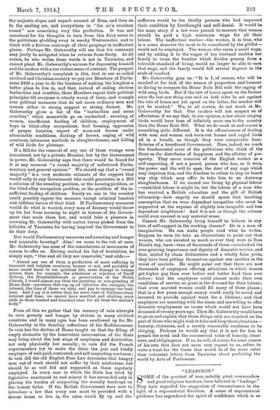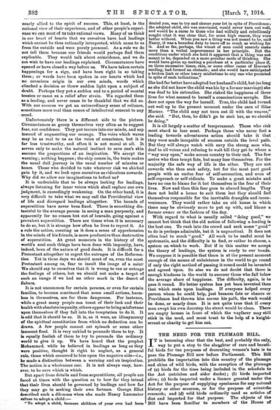"LEADINGS."
SOME of the greatest of men, notably great commanders and great religious teachers, have believed in "leadings." They have regarded the suggestion of circumstances in the light of a supernatural direction. A sense of supernatural guidance has engendered the spirit of confidence which is so nearly allied to the spirit of success. This, at least, is the rational view of their experience, and of other people's experi- ence we can most of re; take rational views. Many of us think in our heart of hearts that we ourselves have had leadings which cannot be thus rationally interpreted, which came to us from the outside and were purely personal. As a rule we do not tell them because our friends would perhaps find them explicable. They would talk about coincidence, and we do not wish to have our leadings explained. Circumstances have opened or have closed a way before us. We have taken certain happenings for a sign, and bare been right in so taking them ; or words have been spoken in our hearts which had no conscious origin in our own minds, words which clinched a decision or threw sudden light upon a subject of doubt. Perhaps they put a sudden end to a period of mental tension or came as a relief after strain. We regarded them as a leading, and never cease to be thankful that we did so. With our success we got an extraordinary sense of reliance, sometimes more real than comes of intellectual consent to any creed.
Unfortunately there is a different side to the picture. Circumstances so group themselves very often as to suggest fear, not confidence. They put terrors into our minds, and sap instead of augmenting our courage. The voice which warns may be as real to us as the voice of conscience, but it is far less trustworthy, and often it is not moral at all. It serves only to make the natural instinct to save one's skin assume the proportions of an inspiration. We accept the warning ; nothing happens ; the ship comes in, the train makes the usual dull journey in the usual number of minutes or hours. Those who decided to take whatever risk we shirked gain by it, and we look upon ourselves as ridiculous cowards. Why did we allow our imaginations to befool us!'
It is undeniable that to be always looking for leadings, always listening for inner voices which shall replace our own judgment, is exceedingly weakening. On the other hand, it is very difficult to take what we may call the Providential view of life and disregard leadings altogether. The bounds of superstition have never been fixed. There is something dis- tasteful to the average person in seeing a man purposely, and apparently for no reason but out of bravado, going against a prevalent superstition. There are times when it is necessary to do so, but it is strange how often he lives to repent it. As a rule the action, creating as it.does a sense of apprehension in the minds of hisfriends, is more productive than destructive of superstition. At great moments in the history of the world's soul such things have been done with impunity, have, indeed, been of the nature of good deeds. It is difficult for a Protestant altogether to regret the outrages of the Reforma- tion. Yet in theee days we should moat of us, even the most Protestant among us, fear to insult the image of a saint. We should say to ourselves that it is wrong to vex or outrage the feelings of others, but we should not make a target of such an image if we had no other mark in the desert of Sahara.
It is not uncommon for certain persons, or even for certain families, to become convinced that some email actions, harm- less in themselves, are for them dangerous For instance, while a great many people can boast of their luck and their health with absolute impunity, others appear to bring misfortune upon themselves if they fall into the temptation to do it It is odd that it should be so. It is, as it were, an idiosyncrasy of the spiritual constitution from which no deduction can be drawn. A few people cannot eat spinach or some other innocent food. It is very unkind to persuade them to try. It is equally foolish of them to try to persuade the ordinary world to give it up. We have beard that the prophet Mohammed, while he believed in leadings as long as they were positive, thought it right to neglect, as a general rule, those which occurred to him upon the negative side—i.e., he made a distinction between a warning and an inspiration. The notion is a wholesome one. It is not always easy, how- ever, to be cure which is which.
But apart from details and from superstitions, all people are faced at times with the question as to how far they intend that their lives should be governed by leadings and bow far they may go in seeking their own fortune. George Eliot described such a dilemma when she made Nancy Lammeter refuse to adopt a child :— " re adept a child, because children of your own had been
denied you, was to try and choose your lot in spite of Providence: the adopted child, she was convinced, would never turn out wen, and would be a curse to those who bad wilfully and rebelliously sought what it was clear that, for some high reason, they were better without. When you saw a thing was not meant to be, said Nancy, it was a bounden duty to leave off so much as wishing for it And so far, perhaps, the wisest of men could scarcely make more than a verbal improvement in her principle. But the conditions under which she held it apparent that a thing was not meant to be, depended on a more peculiar mode of thinking. She would have given up making a purchase at a particular place if, on three successive times, rain, or some other cause of Heaven's sending, had formed an obstacle ; and she would have anticipated a broken limb or other heavy misfortune to any one who persisted in spite of such indications."
She had far better have adopted her husband's child, but (so long as she did not know the child was his by a former marriage) she was deaf to his entreaties. She risked the happiness of three lives for what seemed to herself a conscientious scruple. She dare not open the way for herself. True, the child bad turned out well up to the present moment under the care of Silas Kerner. "The child may not turn out ill with the weaver," she said. "But, then, he didn't go to seek her, as we should be doing."
It is all largely a matter of temperament. Those who risk most stand to lose most. Perhaps those who never feel a leading towards adventurous action should take it that they were made incapable of success outside the level path. Bnt they will always watch with envy the strong men who, deaf to all voices and refusing to wait till they get to where a "way may open," make across country to their end. The few arrive who thus tempt fate, but many lose themselves. For the majority the safe way of life is the other. They are not cowards who thus seek safety, but for the most part good people with an undue fear of self-accusation, and even of self-reproach or self-ridicule. To make a great mistake and have no one to blame for it but themselves is the fear of their lives. Now and then this fear goes to absurd lengths. They dare not build a house to suit them lest they should feel themselves responsible for the inevitable draughts and incon- veniences. They would rather take an old house in which there may be obviously more to put up with, and blame a former owner or the fashion of the day.
With regard to what is usually called "doing good," we cannot but think that the old notion of following a leading is the beet one. To rush into the crowd and seek some " good" to do is perhaps admirable, but it is unpractical. It does not often lead to much "good." All work to be useful must be systematic, and the difficulty is to find, or rather to choose, a system on which to work. But if in this matter we accept the theory of leadings, the system is ready to our -nand& We suppose it is possible that there is at the present moment enough of the means of subsistence in the world to go round if only the right method of passing it round could be invented and agreed upon. So also we do not doubt that there is enough kindness in the world to succour those who fall below the average share of happiness. The difficulty, again, is to pass it round. No better system has yet been invented than that which rests upon leadings. If everyone helped every person whom he could help, just because fate or chance or Providence had thrown him across his path, the work would be done, or nearly done. It is not quite true that if every man swept his own doorstep the street would be clean. There are empty houses in front of which the wayfarer may still stick in the mud, and must trust to the help of a knight- errant or charity to get him out.















































 Previous page
Previous page